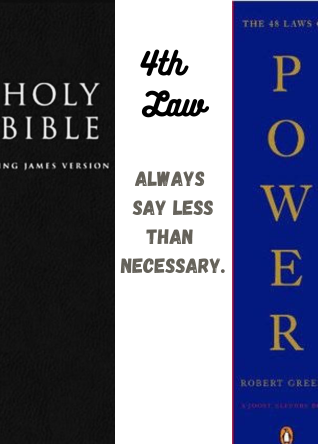Introduction
The Bible, a timeless source of wisdom and inspiration, is replete with characters who exemplified various aspects of human nature, leadership, and power dynamics. Among the numerous laws of power outlined by Robert Greene in his book “The 48 Laws of Power,” the fourth law stands out: “Always Say Less than Necessary.” This essay aims to explore the biblical characters who, knowingly or unknowingly, followed this law and achieved remarkable success and influence through their words and actions. In a friendly tone, we’ll delve into the lives of three such individuals: Joseph, Solomon, and Mary.
Joseph: The Wise Silence of a Dreamer
Joseph, the son of Jacob and Rachel, found himself in a series of challenging circumstances throughout his life. Sold into slavery by his jealous brothers, he eventually rose to prominence in Egypt, second only to Pharaoh. Joseph’s wisdom and mastery of the fourth law of power, “Always Say Less than Necessary,” is evident in his handling of dreams. When Pharaoh asked him to interpret a perplexing dream, Joseph could have embellished his explanation to secure favor. However, he chose to offer a concise interpretation, emphasizing the impending famine. This deliberate brevity not only impressed Pharaoh but also catapulted Joseph into a position of unparalleled authority.
Solomon: The King of Prudent Utterance
King Solomon, renowned for his wisdom, is another biblical figure who understood the power of saying less. The story of the two women who claimed to be the mother of the same baby showcases Solomon’s astute judgment. Instead of resorting to lengthy discourse or argumentation, he proposed a simple solution: to divide the baby in two. His calculated utterance exposed the true mother’s selflessness, highlighting Solomon’s ability to resolve complex situations with minimal words. This judicious use of speech solidified his reputation as a wise and just ruler.
Mary: A Silent Strength
Mary, the mother of Jesus, exemplifies the fourth law of power in a different context. While not a ruler or a political figure, Mary’s strength lies in her silent acceptance of her role in the divine plan. In the face of overwhelming circumstances and societal scrutiny, she responded with humility and trust in the greater purpose. Mary’s unwavering faith and her ability to “say less” about her own fears and doubts, even in the presence of profound events, earned her a place of honor in the Christian faith.
Conclusion
The Bible offers a rich tapestry of characters who navigated the complexities of life and power dynamics while adhering to the fourth law of power: “Always Say Less than Necessary.” Joseph’s concise interpretations, Solomon’s judicious rulings, and Mary’s silent strength are timeless examples of how the strategic use of words, or even the deliberate choice of silence, can lead to remarkable success and influence.
These characters teach us that true power is not always in the volume of our speech but in the wisdom and intention behind our words. Whether in the corridors of political power, the realm of leadership, or the quiet moments of personal faith, the lessons from these biblical figures continue to resonate with us, reminding us of the enduring value of thoughtful and purposeful communication.








































Discussion about this post